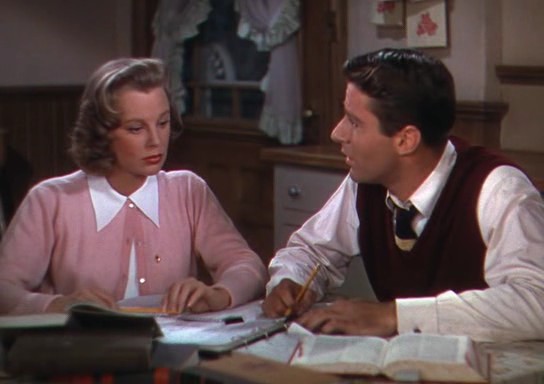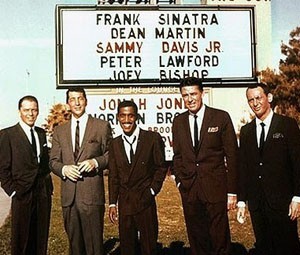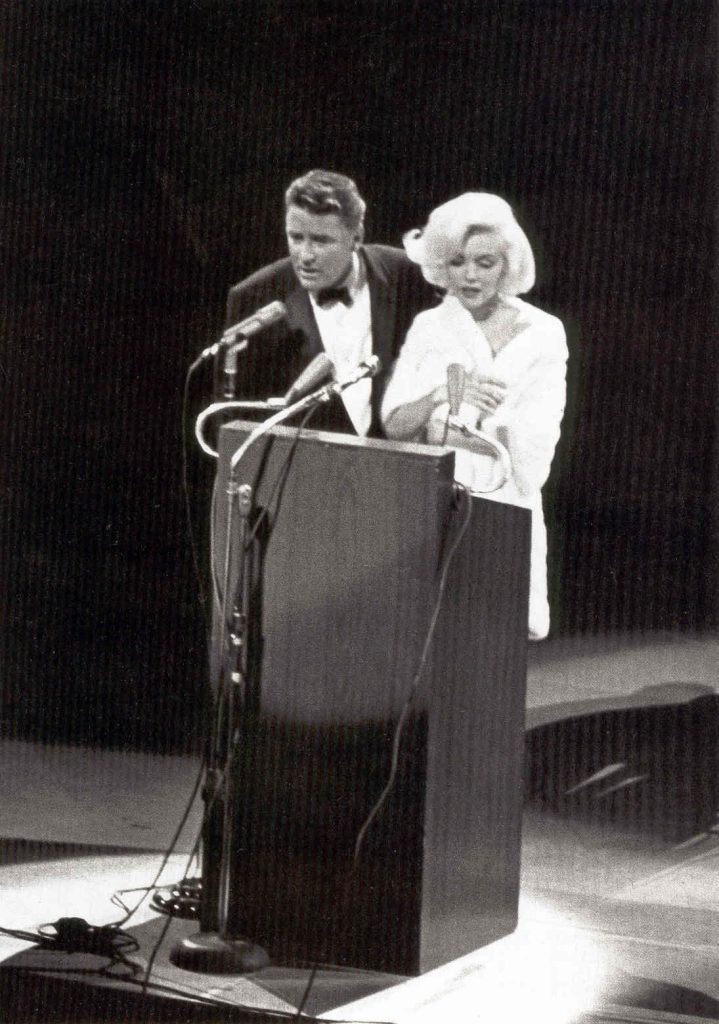Peter Lawford – The Man Who Kept the Secrets

By James Spada (1991)
This is a dense, fact-packed, competently written but somewhat pedestrian account of a very strange, sad man.
Lawford (1923 – 1984) was an urbane English actor with more charm than talent, as can be seen from his mediocre filmography (reasonable performances in MGM confectionary like The White Cliffs of Dover (1944), quite moving as the doomed soldier; Good News (1947) with June Allyson (see below); Easter Parade (1948), and Royal Wedding (1951), and effective 2nd lead roles in It Should Happen to You (1954); Exodus (1960), a neat turn as a nasty, bigoted officer; The Longest Day (1962), suave as Lord Lovat; Dead Ringer (1964), and Buona Sera, Mrs Campbell (1968) – balanced against such deplorable fare as Kangaroo (1952), Ocean’s 11 (1960), The Oscar (1966), Skidoo (1969), and a slew of other films that should have gone straight to video, if that – one pathetic late appearance was the 1979 exploitation flick Angels Revenge, a pallid rip-off of you-know-what, with Lawford as a drug kingpin, a piece later parodied as an episode of the ‘Mystery Science Theater 3000’ series.)
Lawford’s life was far more fascinating than anything he ever did on film. Born out of wedlock to an aging war hero and a frigid, aloof, monstrous woman he described as “a dreadful snob,” his birth was both unwanted and difficult (to revive the newborn, the nurse splashed him with brandy – an early omen), and his nomadic upbringing was one of isolation and training in mores better fitted to early adulthood:
“…Peter refused to play with a little girl aboard ship because she was wearing denim slacks. “She’s an abomination unto the Lord!” he cried. “It says so plainly in the twenty-second chapter of Deuteronomy!””
However, Lawford stowed his Biblical scruples early on. Sexually baptised by a German governess when he was ten, he grew into a right pervert, preferring his raft of wives, girlfriends (and perhaps, occasionally, boyfriends – his mother, May, tried to ‘out’ him to L.B. Mayer), and, of course, call girls by the score, to engage in kinky games of a wide variety. Keep that Cepacol handy! Booze and later on, drugs, accompanied his slow descent into dissolution. But what prompted that slide into depravity?
After a disastrous childhood, surely there was nothing more wholesome than growing up under the tender mercies of Louis B. Mayer, whose diet, according to Herman Mankiewicz, “was his fellow man.” The MGM dream factory had a way of driving its stars around the bend, Lawford and Judy Garland, two seemingly nice people with massive inferiority complexes, being prime examples.
The 1950s were bleak for MGM, so Lawford, not the most versatile of stars, hit the bricks, eking out a living making bad television (and he turned-down the role of James Bond). But then he got hitched to Patricia Kennedy (daughter of Rose and Joseph, sister of Jack, Bobby, Ted et al – a newsreel screamed “Pat Kennedy Marries Actor”) and by virtue of his 1954 entry into that powerful clan, insinuated himself with the Rat Pack, where his thick charm and thin talent were right at home (a light voice that “occasionally fails to land squarely on a note”, modest soft shoe and dramatic ability posed no threat).

Lawford got on best with JFK (he marshalled the celebrity vote in the ’60 election, and gave him crucial tips about presentation during the key first TV debate) who even forgave him his separation and eventual divorce from Pat. After his death though, the family closed ranks and Lawford was excluded from the magic circle of Camelot, and thereafter, banished from Sinatra’s company as well (Frank never forgave Peter for having a fling with Ava). In fact, it seems as though Lawford became a whipping boy for a lot of things he had nothing to do with. As a result, he seemed to behave badly, as typecast. Dropped like a stone by Lana Turner, for example, he turned this shattering event into a practice of dropping partners in a similarly cruelly casual manner.
Yet there are plenty of people – and it seems the author has spoken to almost all of them – willing to state that Lawford was sweet, loving and honourable. Too many concrete examples are offered of this to wave them away. And he clearly was cursed with a filament-like sensitivity as well.
The most notorious example of this is the death of Marilyn Monroe. Peter knew her for years and introduced her to JFK, who eventually ‘handed her over’ to RFK. Lawford blamed himself for her deterioration after the Kennedys cut her loose, and always felt an absolute heel for not having done more for her. It is pretty clear that he was the last person Marilyn spoke to before her death, cold in her bed from barbiturates with the receiver still in her hand, and all through that long night he looms as a key figure – prevaricating about going round there, being talked out of it by his Manager, eventually getting an ‘order’ to go and ‘clean up’ before the police arrived. Monroe had a tell-all diary, mementoes of Jack and Bobby, and possibly left a note. Lawford ensured that the mise-en-scène stayed pristine. This and the links between the Kennedys and organised crime suggest that Lawford kept quite a lot of secrets, the kind of things that make Watergate look like a Christmas pageant.
Despite Frank Sinatra cutting Lawford off, when his son was kidnapped, it was Peter he called. Lawford interceded with Bobby who mobilised the FBI, and restored Frank’s son. Sinatra threw a party to thank everyone who had assisted, but Peter wasn’t invited.
His failures, fears, poverty, ill-health, unhealthy lifestyle and loneliness left him sliding into an abyss:
His Manager saw him about 7 o’clock in the morning, getting ready for a day’s filming in New York, chugging Tanqueray: “It was like he was drinking soda-gulp, gulp, gulp.”
“He kept asking me why his life was falling apart. First he lost his friendship with Sinatra, then Marilyn died, then Jack was murdered. And his marriage was over.’
When Pat left the matrimonial home in Santa Monica and moved to New York, she took with her far more than expected, even the wire hangers. “But Peter made sure he had the last word. A few days after Pat had settled into the Fifth Avenue apartment, she was notified of a delivery from California. Outside her building, three burly, sweating men worked to unload a truckload of five-gallon plastic containers of water- fifty in all. When Pat protested that she hadn’t ordered any water, one of the deliverymen handed her a note that had come with the shipment. It read: “Dear Pat: You forgot to drain the swimming pool.””
Diagnosed with cirrhosis, Peter asks liver specialist Dr Norcross: “Can I have a glass of wine with dinner?” “You can’t even have a piece of rum cake…if you continue drinking, you’ll die.” Stunned by the severity of Norcross’s warning, Peter resolved then and there to stop drinking. A few days later, he and Ebbins [his Manager] left the clinic. The first thing Peter did on the way home was stop at a bar and have a martini.”
Leave a comment...
While your email address is required to post a comment, it will NOT be published.





0 Comments